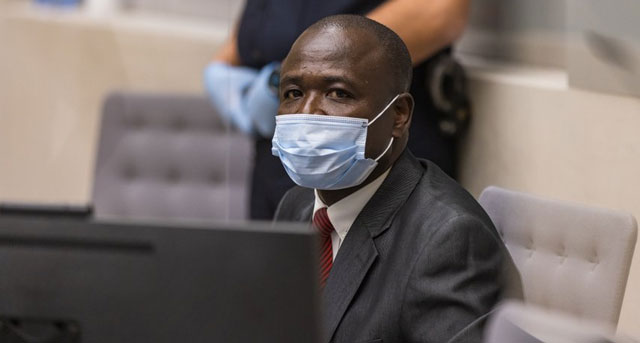
The Hague, Netherlands | THE INDEPENDENT | The International Criminal Court (ICC) Trial Chamber IX has today sentenced former Kony Ugandan rebel commander Dominic Ongwen to a total period of imprisonment of 25 years as a joint sentence for the 61 crimes of which he was found guilty.
A summary of the decision was read out in public by Trial Chamber IX composed of Judge Bertram Schmitt (Presiding judge), Judge Péter Kovács and Judge Raul Cano Pangalangan, in the presence of the Ongwen, his defence team, the Legal Representatives of Victims, and the Office of the Prosecutor. Due to COVID-19 restrictions the decision was delivered on a partially virtual basis.
🎥 #ICC Trial Chamber IX sentences Dominic #Ongwen to a total period of imprisonment of 25 years as a joint sentence for the 61 crimes of which he was found guilty pic.twitter.com/nmc9dMpO6Z
— Int’l Criminal Court (@IntlCrimCourt) May 6, 2021
The trial in this case began on December 6, 2016. On 4 February 2021, Trial Chamber IX found Dominic Ongwen guilty for a total of 61 comprising crimes against humanity and war crimes, committed in Northern Uganda between 1 July 2002 and 31 December 2005.
Ongwen was reportedly the Brigade Commander of the Sinia Brigade of the Lord’s Resistance Army (LRA), at time a warrant of arrest was issued for him in 2005.
The verdict may be appealed by either party to the proceedings. The Appeals Chamber extended the time limit for the filing of the notice of appeal by Ongwen to 21 May 2021. Furthermore, a phase dedicated to the reparations to victims will be opened in due course.
DECISION DETAILS
Judge Bertram Schmitt, Presiding Judge, read a summary of the Chamber’s decision. He highlighted that the Chamber was confronted in the present case with a unique situation.
He said the Chamber was confronted with “a perpetrator who wilfully and lucidly brought tremendous suffering upon his victims. However, it is also confronted with a perpetrator who himself had previously endured extreme suffering himself at the hands of the group of which he later became a prominent member and leader.”
The Chamber, he said, decided to give certain weight in mitigation to the circumstances of Dominic Ongwen’s childhood, his abduction by the Lord’s Resistance Army (LRA) at a very young age and his early stay with the LRA.
The Chamber rejected the Defence’s arguments, recalling its analysis of evidence in the Judgment issued on 4 February 2021, and considered that the mitigating circumstances of substantially diminished mental capacity and duress are not applicable.
The Chamber also rejected the arguments of the Defence concerning traditional justice mechanisms, noting that there exists no possibility under the Statute to replace a term of imprisonment with traditional justice mechanisms, or to incorporate traditional justice mechanisms into the sentence in any other way.
It also noted that Acholi traditional justice mechanisms are not in widespread use, to the extent that they would replace formal justice, and that they are reserved to members of the Acholi community, meaning that their use would mean that some victims belonging to other ethnic groups would be excluded.
The Chamber emphasised that reconciliation, whatever its form, is a process in which victim participation is essential, and noted that it is clear that many victims of the crimes committed by Dominic Ongwen do not support the idea of traditional justice in the present case, and that they have also criticised the fact that submissions in this regard were made to the Chamber without consulting them.
The Chamber analysed one-by-one the gravity of each of the 61 crimes for which Dominic Ongwen was convicted, finding several aggravating circumstances applicable to some or even most crimes. Aggravating circumstances included particular cruelty, multiplicity of victims, the victims being particularly defenceless, and discrimination on political grounds and discrimination against women. The Chamber imposed individual sentences for each crime, taking the mitigating circumstance of Dominic Ongwen’s childhood and abduction by the LRA into due account. The highest individual sentences were of 20 years. Other sentences pronounced for individual crimes were of 14 or 8 years of imprisonment.
****
SOURCEE: ICC MEDIA
 The Independent Uganda: You get the Truth we Pay the Price
The Independent Uganda: You get the Truth we Pay the Price





